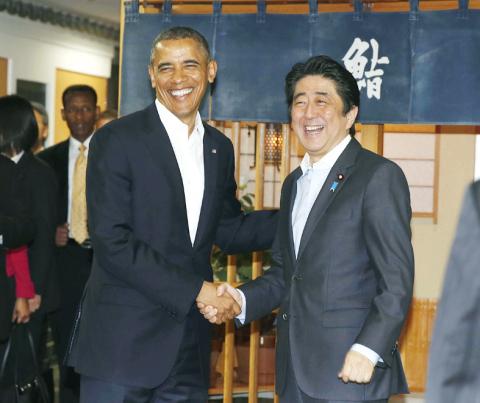US President Barack Obama confirmed yesterday that the US’ mutual security treaty with Japan applies to the islands at the center of a territorial dispute between China and Japan.
“The policy of the United States is clear,” he said in a written response to questions published in the Yomiuri Shimbun before his arrival in Tokyo at the start of a four-country Asia tour.
“The Senkaku Islands are administered by Japan” and therefore fall under the US-Japan treaty, he wrote. “And we oppose any unilateral attempts to undermine Japan’s administration of these islands.”

Photo: Reuters
His statement seems aimed at reassuring Japan that the US would come to its defense if China were to seize the islands, known in Taiwan as the Diaoyutai Islands (釣魚台) and in China as the Diaoyu Archipelago (釣魚群島).
Russia’s annexation of Crimea has sparked concern about the US’ political will to protect Asian allies, notably in Japan and the Philippines.
A Chinese government spokesman responded that China has “indisputable sovereignty” over the islands, and said “the so-called Japan-US alliance” should not harm China’s territorial rights.
“We firmly oppose applying the Japan-US security treaty in the issue of the Diaoyu Islands,” Chinese Ministry of Foreign Affairs spokesman Qin Gang (秦剛) said at a regular briefing.
“The US should respect facts, take a responsible attitude, remain committed to not taking sides on territory and sovereignty issues, speak and act cautiously, and earnestly play a constructive role in regional peace and stability,” he added.
Obama told the Yomiuri the US is deepening its ties with China, but “our engagement with China does not and will not come at the expense of Japan or any other ally.”
He said the US will continue to take steps to reduce the impact of its military presence in Okinawa, but added: “It’s important to remember that the US Marine Corps presence on Okinawa is absolutely critical to our mutual security. It plays a key role in the defense of Japan.”

PREPAREDNESS: Given the difficulty of importing ammunition during wartime, the Ministry of National Defense said it would prioritize ‘coproduction’ partnerships A newly formed unit of the Marine Corps tasked with land-based security operations has recently replaced its aging, domestically produced rifles with more advanced, US-made M4A1 rifles, a source said yesterday. The unnamed source familiar with the matter said the First Security Battalion of the Marine Corps’ Air Defense and Base Guard Group has replaced its older T65K2 rifles, which have been in service since the late 1980s, with the newly received M4A1s. The source did not say exactly when the upgrade took place or how many M4A1s were issued to the battalion. The confirmation came after Chinese-language media reported

A Ministry of Foreign Affairs official yesterday said that a delegation that visited China for an APEC meeting did not receive any kind of treatment that downgraded Taiwan’s sovereignty. Department of International Organizations Director-General Jonathan Sun (孫儉元) said that he and a group of ministry officials visited Shenzhen, China, to attend the APEC Informal Senior Officials’ Meeting last month. The trip went “smoothly and safely” for all Taiwanese delegates, as the Chinese side arranged the trip in accordance with long-standing practices, Sun said at the ministry’s weekly briefing. The Taiwanese group did not encounter any political suppression, he said. Sun made the remarks when

The Taiwanese passport ranked 33rd in a global listing of passports by convenience this month, rising three places from last month’s ranking, but matching its position in January last year. The Henley Passport Index, an international ranking of passports by the number of designations its holder can travel to without a visa, showed that the Taiwan passport enables holders to travel to 139 countries and territories without a visa. Singapore’s passport was ranked the most powerful with visa-free access to 192 destinations out of 227, according to the index published on Tuesday by UK-based migration investment consultancy firm Henley and Partners. Japan’s and

BROAD AGREEMENT: The two are nearing a trade deal to reduce Taiwan’s tariff to 15% and a commitment for TSMC to build five more fabs, a ‘New York Times’ report said Taiwan and the US have reached a broad consensus on a trade deal, the Executive Yuan’s Office of Trade Negotiations said yesterday, after a report said that Washington is set to reduce Taiwan’s tariff rate to 15 percent. The New York Times on Monday reported that the two nations are nearing a trade deal to reduce Taiwan’s tariff rate to 15 percent and commit Taiwan Semiconductor Manufacturing Co (TSMC, 台積電) to building at least five more facilities in the US. “The agreement, which has been under negotiation for months, is being legally scrubbed and could be announced this month,” the paper said,